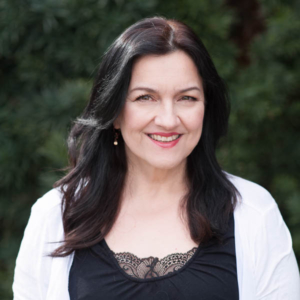Before and Beyond the Moon
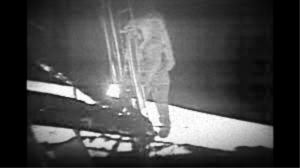
NASA picture: Neil Armstrong descends the ladder of the lunar module.
The Gateway Science Museum in Chico is two hours north of our house in Sacramento. It’s one-part hands-on exhibits, one part mad-scientist’s workshop. I love it because Harmony, Alannah, and Scarlett, my granddaughters, discover the secrets of science there as only a child can.
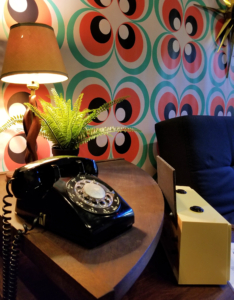 The museum currently has an exhibition called Before and Beyond the Moon, to commemorate the 50th anniversary of the Apollo 11 landing. The exhibition entrance is set up like a 1969 living-room, with a black-and-white television showing a video loop of the lunar module landing. The mid-century sofa and starburst clock on the wall make me feel like I’ve stepped back in time. I remember watching the event when I was six years old, sitting cross-legged on the carpet, a child who had to be told to back away from the television.
The museum currently has an exhibition called Before and Beyond the Moon, to commemorate the 50th anniversary of the Apollo 11 landing. The exhibition entrance is set up like a 1969 living-room, with a black-and-white television showing a video loop of the lunar module landing. The mid-century sofa and starburst clock on the wall make me feel like I’ve stepped back in time. I remember watching the event when I was six years old, sitting cross-legged on the carpet, a child who had to be told to back away from the television.
The girls run to the sofa and sit down. They pick up laminated magazines from the coffee table in front of them. I sit in an adjacent chair, and we start watching the grainy NASA feed together.
“What’s that?” Harmony asks. When I look at her, she’s pointing to a disconnected black rotary phone on the table next to me.
“That’s a telephone,” I say, smiling. I remember a similar conversation I once had with her mother about a record album. “That’s the kind of phone we used to call each other.”
All three girls stand up and gather around it.
“How does it work?” Alannah asks.
I pick up the receiver and demonstrate dialing. They watch the slow movement of the dial to and from the finger-stop. I challenge them to try for themselves.
“Why not try dialing your Mom’s number?” I say, handing the receiver to Harmony. She tries, then gives Alannah and Scarlett a turn. It takes patience. I explain how 911 became a shortcut for emergency calls.
“Now you,” Harmony says, handing me the receiver. “Pretend it’s 1969. Who would you call?”
I don’t have to think hard: “My Grandma.”
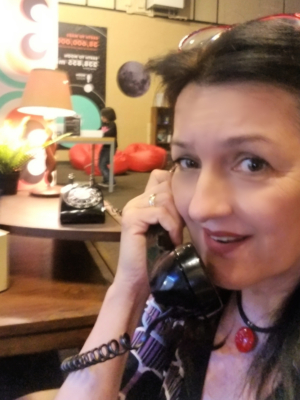 The girls seem satisfied with my answer. They run to build a lunar landing site with a docent at the Lego station around the corner. They leave me with the phone receiver in my hand, thinking of my Grandma: a small, Mexican-American woman whose distinct voice still echoes in my heart. Her words are so deeply embedded in my marrow, she’s part of me.
The girls seem satisfied with my answer. They run to build a lunar landing site with a docent at the Lego station around the corner. They leave me with the phone receiver in my hand, thinking of my Grandma: a small, Mexican-American woman whose distinct voice still echoes in my heart. Her words are so deeply embedded in my marrow, she’s part of me.
***
My current writing project, a family memoir, has challenged every preconceived idea I’ve had about writing. It requires the same rigorous discipline and commitment as any project, but carries the added weight of accurately and honorably representing family. I’ve recently transcribed Grandma’s voice, telling the story of her childhood in Mexico and the life she and Grandpa built here. Hearing her voice only makes me miss her more. So many times, I wish I could talk to her again.
I still remember her phone number, even though she’s been gone for twenty-seven years. I dial it and wait for her to answer. It doesn’t seem so impossible.
In my mind’s eye, I can see her walk from her kitchen to the living room, wiping her hands on her apron. She lifts the receiver to her ear and speaks: Hello?
“Hi, Grandma! It’s me, Janet.”
Hi, mija! How are you? How is Mario?
“I miss you so much,” I say. Then, I start crying. In the middle of the exhibit, with the sounds of Apollo 11 pinging steadily in the background, I can’t stop. I put my hand to my mouth and sob.
***
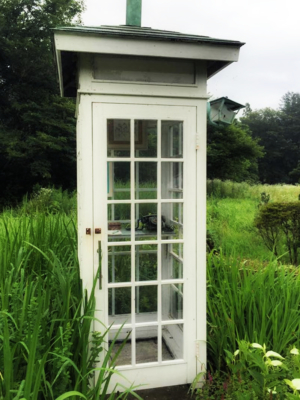
kaze no denwa
The phone reminds me of the Japanese kaze no denwa, or “wind phone,” an otherworldly creation of 72-year-old garden designer, Itaru Sasaki. After his cousin died in 2010, Sasaki set up a glass-paneled phone booth in his hilltop garden, near Otsuchset, Japan, which overlooked the bay. He put an old, disconnected, black rotary phone inside. Every time Sasaki missed his deceased cousin, he went to the phone booth and called him.
A year later, Japan suffered three disasters in a row: a 9.0 earthquake, a tsunami, and the meltdown at the Fukushima Nuclear Power Plant. Sasaki opened his “wind phone” to his fellow citizens. People arrived from all over, lining up to call family and friends who had died suddenly. Sasaki eventually set up a wooden bench for the people who waited to use it. Even in the dead of winter, with snow on the ground, it’s estimated that 10,000 people used his hilltop phone booth that year.
Beyond the realms of science, a disconnected rotary phone can help someone with the complicated process of grieving.
***
I eventually calm down and talk to Grandma about everything. She encourages me to continue doing my best with writing the book; she assures me that everything will work out. I tell her about the museum, my beautiful granddaughters, the lunar landing and the phone which made me call her in the first place. Somehow, I know it’s almost time to hang up.
“Grandma,” I say, inhaling deeply. “I’m pretty happy.”
That’s good, Mija.
“Mom had a stroke, though.” I start crying again.
I know, mija. She’s going to be okay.
“I love you, Grandma.”
I love you, too, mija. Everything will work out. Don’t worry, okay?
I hang up the phone. Behind me, Alannah asks me if I’m alright.
“I’m okay, honey,” I say. I start looking for a tissue in my messy purse. I find a folded-up napkin and blow my nose. “I didn’t know you were standing there.”
“Were you pretend-talking with your Grandma?”
I try to smile. “Yes.”
Alannah and Harmony put their arms around me. Scarlett watches from the coffee table, looking a little confused. Behind her, Neil Armstrong descends the ladder in his Apollo spacesuit.
“Watch this!” I whisper, pointing to the television. “Listen to what he is going to say.”
Together, we watch the grainy screen. Walter Cronkite takes off his glasses, overwhelmed with emotion. Wally Schirra wipes his eyes. Neil Armstrong says his legendary line. Both commentators try to figure out exactly what he said.
“That’s one small step for man; one giant leap for mankind,” I say aloud. The girls look at me.
“Is that what he said?” Alannah asks.“What the heck does that mean?”
We laugh.
***
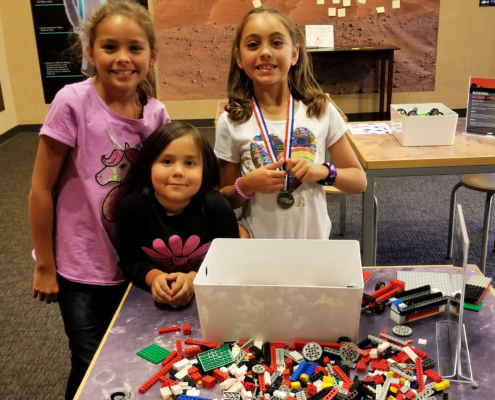
Harmony, Scarlett, and Alannah build a landing site.
One day, I might pick up a disconnected rotary phone to call my parents. For now, they’re with me, but I’m always surprised at how often the subject of mortality makes its way into our conversations. I don’t like being reminded that our lives are finite, an annoying little detail that’s always hovering in the background like a cabbage moth. One day, my own (adult) children will face the reality of life without parents.
One day my granddaughters may want to use a kaze no denwa to call me, or as Alannah says, “pretend talk” to me. If they do, I hope they are comforted by what I say: I love you too,mija. Everything will work out. Don’t worry, okay? It won’t be too hard for them to hear me. My voice will already be running through their veins, so deeply embedded in their tender marrow that my words are already a part of them.
Janet Rodriguez is an author, teacher, and editor living in Northern California. Her recent work has appeared in Eclectica Magazine, The Rumpus, Cloud Women’s Quarterly, Salon.com, American River Review, and Calaveras Station. Rodriguez has also co-authored two biographies in South Africa. Her short stories, essays, and poetry usually deal with themes of morality in faith communities and the mixed-race experience in a culturally binary world. Currently she is a Cardinal MFA candidate at Antioch University, Los Angeles. Follow her on Twitter @brazenprincess, Instagram @janetmario or check out her personal blog at www.brazenprincess.com

